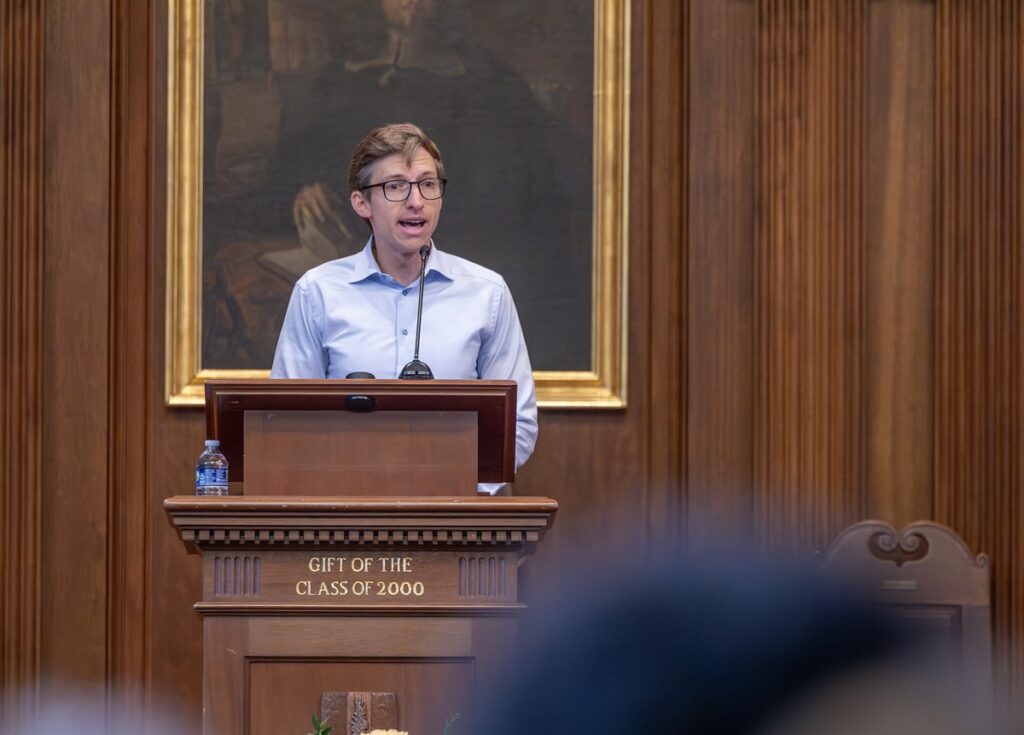Jarvis Lecturer, Dr. Chris Miller, On Microchips and Global Economics
Over twenty years ago, Roxbury Latin hosted the inaugural F. Washington Jarvis International Fund Lecture, now one of the school’s proudest traditions. The series of lectures is named for the man who, for thirty years, served as Roxbury Latin’s tenth Headmaster. The annual event has brought a variety of distinguished public servants and thinkers on foreign affairs, including former Secretary of Defense Robert Gates; homeland security advisor to President Obama, Lisa Monaco; and former Director of the CIA, John Brennan. On October 28, the school hosted its 22nd speaker in welcoming Dr. Chris Miller, bestselling author of Chip War: The Fight for the World’s Most Critical Technology, professor of International History at the Fletcher School of Tufts University, and nonresident senior fellow at the American Enterprise Institute.
Dr. Miller’s area of research focuses on technology, geopolitics, economics, international affairs, and Russia. His lecture specifically addressed the history of harnessing processing power through semiconductors and how society’s pervasive use of microchips impacts today’s economic and geopolitical sphere.
“Most of you probably don’t spend much time thinking about semiconductors, the tiny computer chips that power everything from your smartphones to the world’s largest data centers,” Dr. Miller stated. “I’d like to suggest to you that you cannot understand the world today without putting computer chips at the center of your analysis.” He continued by emphasizing how most people are ignorant of the complexity and power of something so small and seemingly inconsequential to many. “A processing chip is one of the most complex and sophisticated devices ever produced by humans,” he emphasized. “Can you imagine having a processor chip with 20 billion tiny devices called transistors carved out of a piece of silicon the size of your fingernail?” This statement was met with astonishment and fascination by the audience of students, faculty, and staff.
Dr. Miller continued to explain how significantly the chip’s increased computing power, and the world’s increasing reliance on the technology—in manufacturing, but also in defense and AI systems—play into international relations and global economics worldwide. An example is the historically allied relationship between the United States and Taiwan, where a single company, the Taiwan Semiconductor Manufacturing Company, produces over 90% of the world’s advanced processor chips, smartphone chips, PC chips, and telecoms networks, and 99% of the world’s artificial intelligence processors.
Dr. Miller is the author of three other books on Russia, including Putinomics: Power and Money in Resurgent Russia; We Shall Be Masters: Russia’s Pivots to East Asia from Peter the Great to Putin; and The Struggle to Save the Soviet Economy: Mikhail Gorbachev and the Collapse of the USSR. He previously served as the Associate Director of the Brady-Johnson Program in Grand Strategy at Yale; a lecturer at the New Economic School in Moscow; a visiting researcher at the Carnegie Moscow Center; a research associate at the Brookings Institution; and as a fellow at the German Marshall Fund’s Transatlantic Academy. He earned his PhD and MA from Yale University and his BA in history from Harvard University.
Roxbury Latin offers its thanks—as always—to Jack and Margarita Hennessy for funding the annual opportunity for our boys to hear from such distinguished thinkers on world affairs over the years. Mr. Hennessy is a member of the Class of 1954 and a former member of Roxbury Latin’s Board of Trustees. Throughout their lives, he and Mrs. Hennessy have represented an unusual engagement with other nations and cultures. Throughout their lives, too, they have generously provided philanthropic support so that others might come to know and appreciate various corners of our increasingly interconnected world.

